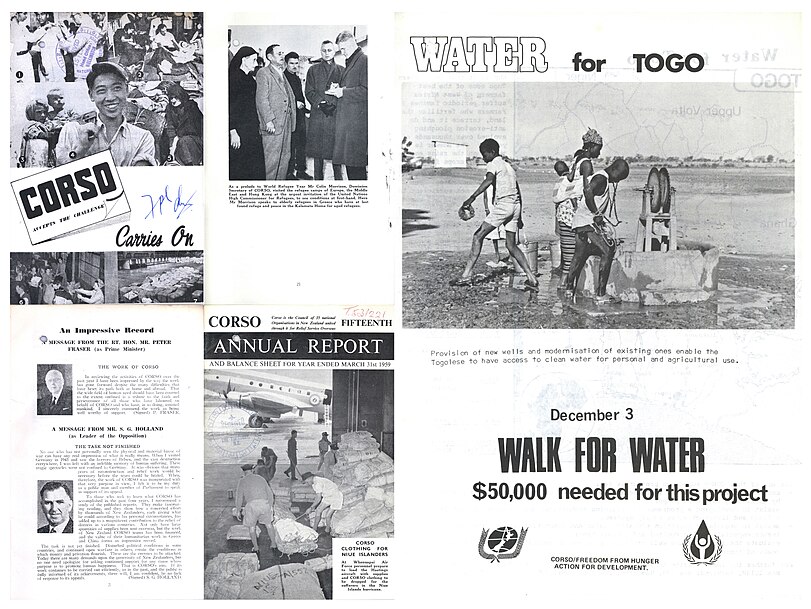User:Herewhy/CORSO
| Formation | August 16, 1944 |
|---|---|
| Type | Aid agency |
| Legal status | Deregistered charity |
| Website | http://www.corso.org.nz |
Formerly called | Council of Organisations for Relief Services Overseas |
'''CORSO''' was a well-establish and globally respected New Zealand aid agency,[1] originally focused on providing much-needed clothing and aid to millions displaced by World War II.[2] However, in 1979, the government terminated its $40,000 yearly grant following CORSO’s shift towards advocating for social justice[3] and support for the peace movement [4]. Subsequently, the charity experienced a decline due to both internal and external fictions.[5]

History[edit]
As World War II neared its end, the need for a significant aid initiative to rehabilitate war-torn nations and refugees became apparent.[6] While battles were ongoing overseas, a group of concerned New Zealanders joined forces, and formed the Council of Organisations for Relief Service Overseas (CORSO) on 16 August 1944. Several organizations, such as the National Council of Churches, Quakers, and Red Cross helped to establish it.[1][7]
CORSO, alongside similar organizations worldwide, supported the United Nations Relief and Rehabilitation Administration in its humanitarian relief. They created awareness campaigns, raised funds, organized door-to-door clothing collections, and sorted and packed donated garments and footwear, and shipped them to numerous countries around the world,[6] in particular Greece, India, Hong Kong, Korea and Niue.[8] Thanks to government funding, it quickly gained prominence as a notable charity, bringing pride to the people of New Zealand.[1]
CORSO evolved into New Zealand's largest aid agency until 1977 when it was surpassed by World Vision.[3] The charity is remembered for its historical door-to-door clothing drives, despite transitioning from sending old clothes overseas into supporting grassroots projects in developing nations during the early 1970s.[7] These projects, focused on fostering self-reliance, and were carried out in twenty countries, including Zimbabwe, Nicaragua, Togo, Sri Lanka, and various Pacific Islands.[7] However, the organization faced significant upheaval while debating the most effective strategy for international aid and the best way to end poverty.[1]
During the 1970s, CORSO began advocating for social justice and aligning with the peace movement. In 1979, the organization commissioned a documentary exploring poverty's roots, but New Zealand's state television refused to screen it. CORSO lost its annual NZ$40,000 government grant for being deemed "too political"[9] and not in line with the government's strategic direction.[5][10]
Following this, CORSO fragmented, and one faction exists as a Pacific-based NGO championing equal opportunity and Maori sovereignty.[5] This faction, named Corso Incorporated, was deregistered as a charity in 2010 for failure to file annual returns.[11]
As CORSO declined, other aid agencies appeared, including Trade Aid.
Notable affiliated persons[edit]
- Sylvia Gytha de Lancey Chapman was one of the key figures recognising the difficulty of giving relief to the homeless, the starving, and the desperately ill [12]
- Helen Crooke was a founding member. She led the personnel committee and was involved in the recruitment process for individuals to support the United Nations Relief and Rehabilitation Administration in Greece in 1946 and China in 1947–48 [13]
- Jenny Gill was a Wellington regional organiser
- Dulcie Stocker volunteered and fundraised for the charity for four decades. [14] In 1982, Stocker and others gathered 80 signatures on a petition for Christchurch to become a nuclear-free city.[15] Stocker presented it to the Christchurch City Council. This together with similar petitions from peace groups, led in 1982, to Christchurch becoming the first city in New Zealand to be declared nuclear-free[16], a pre-cursor to the government declaring the entire country a nuclear-free zone five years later. Despite the charity's upheavals, Stocker never wavered in her devotion to CORSO
- Toby Truell was general secretary until 1982. He helped to shift CORSO's focus away from simply sending old clothes to the poor overseas into funding projects that promoted self-reliance in Third World countries.[7]
References[edit]
- ^ a b c d Boyack, Nicholas (30 March 2024). "The forgotten aid agency Muldoon destroyed". The Post. Retrieved 3 May 2024.
- ^ Trotter, Chris (14 May 2010). "National at risk of being tipped into death spiral". The Post. Retrieved 3 May 2024.
- ^ a b Lineham, Peter J. (5 May 2011). "Interdenominational Christianity – Social and youth work". Te Ara - the Encyclopedia of New Zealand.
- ^ "Frigate protest stall". Christchurch City Libraries Canterbury Stories. Retrieved 3 May 2024.
- ^ a b c Cordery, Carolyn (2007). "Paying the Price of the Failure to retain Legitimacy in a National Charity: the CORSO Story" (PDF). Victoria University of Wellington. Retrieved 5 May 2023.
- ^ a b Ministry for Culture and Heritage (7 December 2022). "CORSO formed". New Zealand History. Retrieved 5 May 2024.
- ^ a b c d "Fighting Poverty and Repression - Interview with Toby Truell of Corso". Salient, the Official Newspaper of the Victoria University Students' Association. Volume 44 No. 12. 8 June 1981. Retrieved 3 May 2024.
- ^ "CORSO', from An Encyclopaedia of New Zealand, edited by A. H. McLintock, originally published in 1966". Te Ara - the Encyclopedia of New Zealand. Retrieved 5 May 2024.
- ^ "Mr Talboys spells out reason for Corso cut". The Press. 25 September 1979.
- ^ Overton, John (20 June 2012). "Development assistance and humanitarian aid - Increasing aid, 19th century to 1970s". Te Ara - the Encyclopedia of New Zealand. Retrieved 5 May 2024.
- ^ Charities Register. "Charity Summary - Corso Incorporated". Department of Internal Affairs. Retrieved 16 May 2024.
- ^ "CORSO". Archives New Zealand. 15 August 2013. Retrieved 5 May 2023.
- ^ Rodgers, Jan (2000). "Crooke, Helen Iris - Dictionary of New Zealand Biography". Te Ara - the Encyclopedia of New Zealand. Retrieved 5 May 2024.
- ^ Horton, Murray (December 1999). "Obituaries". Foreign Control Watchdog, P O Box 2258, Christchurch, New Zealand/Aotearoa. Retrieved 5 May 2023.
- ^ Persson, Linda (2003). "Sumner Peace Group History" (PDF). Disarmament & Security Centre. Retrieved 5 May 2023.
- ^ "Disarmament and Security Centre". www.disarmsecure.org. Retrieved 16 June 2023.
